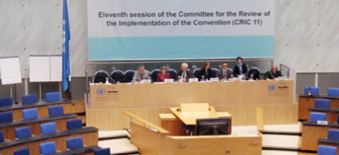In a keynote address by Tarja Halonen, former President of Finland and Chair of the High-level Panel on Global Sustainability, participants at the third Special Session of the Committee on Science and Technology (CST S-3) of the UN Convention to Combat Desertification (UNCCD) and the UNCCD 2nd Scientific Conference were reminded that sustainable land management can be one of the most important tools for poverty eradication, and they were challenged to send a strong message that a land degradation neutral world is possible, with concrete targets and a monitoring system to follow progress.
 12 April 2013: In a keynote address by Tarja Halonen, former President of Finland and Chair of the High-level Panel on Global Sustainability, participants at the third Special Session of the Committee on Science and Technology (CST S-3) of the UN Convention to Combat Desertification (UNCCD) and the UNCCD 2nd Scientific Conference were reminded that sustainable land management (SLM) can be one of the most important tools for poverty eradication, and they were challenged to send a strong message that a land degradation neutral world is possible, with concrete targets and a monitoring system to follow progress.
12 April 2013: In a keynote address by Tarja Halonen, former President of Finland and Chair of the High-level Panel on Global Sustainability, participants at the third Special Session of the Committee on Science and Technology (CST S-3) of the UN Convention to Combat Desertification (UNCCD) and the UNCCD 2nd Scientific Conference were reminded that sustainable land management (SLM) can be one of the most important tools for poverty eradication, and they were challenged to send a strong message that a land degradation neutral world is possible, with concrete targets and a monitoring system to follow progress.
The events convened from 9-12 April 2013, at the World Conference Center in Bonn, Germany. Participants at the UNCCD 2nd Scientific Conference focused on the theme ‘Economic assessment of desertification, SLM and resilience of arid, semi-arid and dry sub-humid areas’ in a series of four plenary sessions, 33 parallel panel sessions and two poster sessions, all of which were organized by the Global Risk Forum (GRF) Davos, as the lead institution, under the guidance of the CST Bureau.
The Scientific Conference was embedded within the CST meeting, which held opening and closing sessions prior to and after the Scientific Conference’s opening and closing sessions. An open-ended CST contact group met during the four days to draft a decision on its agenda items, which included: the work of the ad hoc Advisory Group of Technical Experts (AGTE) in refining the impact indicators; a review of scientific information submitted by affected country parties during the 2012 reporting and review cycle; and preparations for the UNCCD 3rd Scientific Conference, which will consider the theme ‘Combating desertification, land degradation and drought (DLDD) for poverty reduction and sustainable development: the contribution of science, technology, traditional knowledge and practices.’ The CST also took note of a preliminary summary of the UNCCD 2nd Scientific Conference, which was submitted by the President of GRF Davos.
Approximately 350 participants attended the meetings, almost half of whom were from the scientific community. Participants presented research regarding best practices in the face of DLDD, documenting landowners’ efforts to adapt to change, and proposing methodologies for evaluating the costs and benefits of sustainable land management.
Throughout the week, participants also highlighted the need for, and challenged each other to, conduct more targeted research related to the application of the results discussed in Bonn to the questions that local, national, regional and international decision makers face. The proceedings of the meetings will be transmitted to the eleventh session of the UNCCD Committee for the Review of the Implementation of the Convention (CRIC 11), which opens on 15 April 2013 and to the eleventh meeting of the CST, which will convene in parallel to the eleventh meeting of the Conference of the Parties (UNCCD COP 11) later in 2013. [IISD RS Coverage of CST S-3 and UNCCD 2nd Scientific Conference] [UNCCD Press Release][GRF Davos website for UNCCD 2nd Scientific Conference]